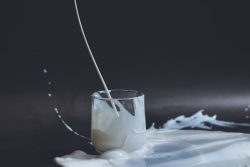For Today’s Book Review: Nature Wants Us to Be Fat by Dr. Richard Johnson
I am fat. I didn’t used to be, but since menopause the pounds have come on. This is despite the fact that my diet is highly controlled, I am competitive powerlifter who lifts heavy 4 times a week and I walk about 10k steps per day. All of this and the weight just piled on over the last few years. So, when I saw this book, I thought to myself, “yes, that is the reason I am fat – nature wants it that way.” Well, it is not so simple, but the title alone sold me.
It just so happens to be a very well-researched and well-written book on why nature wants us fat, sometimes. There is a survival switch deep in the brain that tells us to feast in times when food is abundant so that we can survive when it is scarce. The only problem is that for most of us, food is not scarce and we rarely have periods of starvation unless we purposely fast. It also tells us to store fat when we are dehydrated. Fat, it turns out, is a wonderful source of water, and in some cases, the storage of fat is simply a compensation for longstanding dehydration.
Animals have this switch as well. Indeed, much of the author’s research is based upon how animals survive periods of starvation or drought. The most notable examples include bears consuming vast amounts of fruit in order to survive hibernation, hummingbirds consuming half of their body daily just to survive, or camels and other desert dwelling animals storing excess fat as a source of water. In each of these instances fat is useful and purposeful. It is a reservoir for energy and water. Unfortunately for most of us humans, the same survival imperative that tells us to store fat can be triggered unnecessarily by modern foods.
What is this trigger, you ask? What makes us consume more food and store more fat than we need? Fructose. More specifically in the case of human obesity, high fructose corn syrup (HFCS). While bears consume huge amounts of fruit to achieve the weight gain needed to survive the long winter, we humans do not. We tend consume our fructose in the form of HFCS added to processed foods. If one is a regular consumer of processed foods, then fructose intake can be quite high and just like the bear, we gain weight. Except, we do not have a period of forced starvation like the bear, nor are we as active as the hummingbird, and so the survival switch becomes turned on permanently.
I recently wrote a paper on HFCS (here) relative to the production of an anti-thiamine molecule called oxythiamine. It turns out that the same pathway that induces oxythiamine and uric acid, because of the diminished energy/ATP (fructose costs more ATP to process than it provides), also drives excessive hunger, cravings, and over-eating. This make sense. If we consume a food that costs more energy than it provides, we will remain hungry. The drop in ATP drives this hunger because deep down in the cells, the mitochondria are actually starving. Nature’s way of preventing that is by forcing us to eat more. Ditto for dehydration. If we do not drink enough water or consume enough or the appropriate balance of electrolytes so that we can use this water, our bodies may decide to begin storing fat as a protective measure. These are just a few of the arguments made by Dr. Richard Johnson, the author of Nature Wants Us to Be Fat and an earlier book called The Fat Switch (which I have not read yet).
Sadly, while all this makes perfect sense, it does not seem to explain my menopausal weight gain. I avoid the two major drivers. I am well hydrated and my fructose intake is minimal and from whole fruits only. I don’t have cravings in the way he describes, except perhaps for a big juicy steak after a heavy deadlift workout. As a kid and a young woman though, HFCS and the wonder of processed foods were gaining prominence, so perhaps I altered my metabolism decades ago and am only now paying the price. Regardless of my struggles with weight gain, Dr. Johnson’s research and theories are spot on and are likely applicable to a large portion of the population. The book is very easy to read and I thoroughly enjoyed reading it. I also learned a few things, which is always a good thing. I highly recommend this book. If you purchase it through the link below, I get a few dollars that help support this website.
[atkp_product id=’48853′ template=’bestseller’ containercss=’atkp-center’][/atkp_product]
We Need Your Help
More people than ever are reading Hormones Matter, a testament to the need for independent voices in health and medicine. We are not funded and accept limited advertising. Unlike many health sites, we don’t force you to purchase a subscription. We believe health information should be open to all. If you read Hormones Matter, and like it, please help support it. Contribute now.
















Seems like an interesting read! And that sounds like a frustrating situation to be in. It could, in part, be a matter of the gut biome. The below study shows a specific probiotic formulation reduced body weight and increased “wellbeing” in participants after 6 months. The specific strains are found in the product “HMF Metabolic” (no affiliation). (I found this study and probiotic through Probiotic Guide USA— a very useful tool for looking up specific conditions and what probiotic strains may help!).
https://www.ncbi.nlm.nih.gov/pmc/articles/PMC7060206/
I too packed on a lot of menopausal weight. I attribute this to 3 factors: 1) a fibroid tumor. Fibroids make us fat. 2) my thyroid. It simply tanked even though I ate clean and used clean products. It’s now a medicated thyroid. 3) Lack of motion. Having a problematic fibroid and failing thyroid I stopped being active. I tried but my energy was too low.
I had UFE for my fibroid. This killed it. It died and shrank by 90%. The period before UFE lasted 84 days. The period after UFE lasted 3 days. No more bloating, swelling and misery. This was a game changer.
I took Armour for my thyroid but never felt great on it. Couldn’t get it at all during pandemic. Recently started Synthroid, something I didn’t want to do because I despise pharmaceutical companies but it helped! I have more energy and my metabolism is working. I’ve lost over 20lbs.
Without a bleeding fibroid and stagnant thyroid I was inspired to join a gym. I have learned I need 30 minute workouts. Hard routines are too exhausting where short workouts primarily with weights is manageable.
I have wondered about the weight I gained and if this is a result I’d nature’s way? It’s not for all. I saw results when I stopped treating my older body like I did my younger body.
Have a look at Brad Marshal’s theory of obesity (human torpor) – you will be shocked how easy it is